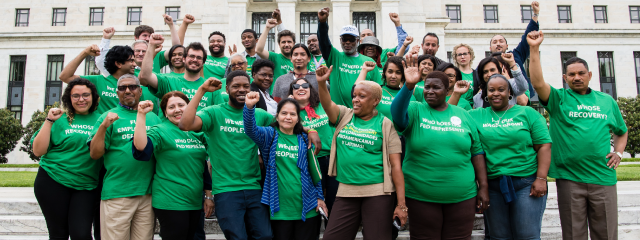Blog
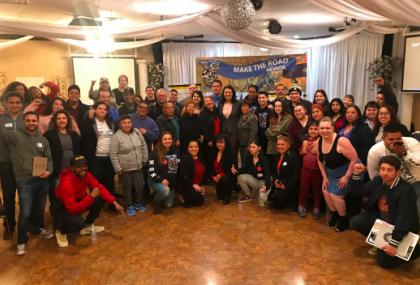
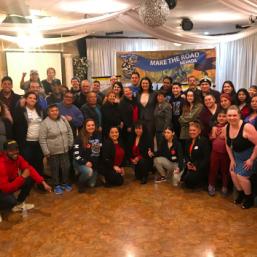
From March 3-7, 35 lead organizers and their teams from six CPD affiliates across the country joined Make the Road Nevada for an organizer training and community engagement blitz in Nevada. This program combines intensive training and cross-affiliate cohort building with direct experience in the field. It also engages a significant number of newly organized members for affiliates. Our team grounded the program in the direct needs of affiliate organizers, tailoring training to fit the skills and campaigns they are driving. Participating affiliates included CASA MD and VA, Good Jobs Now (MI), LUCHA (AZ), Make the Road NV, Make the Road PA, One PA, and UNE (CO).
Each day combined training with one aspect of field organizing, including canvassing for membership, one-on-one meetings and second visits, phone banking, peer-to-peer texting and Make the Road Nevada’s membership meeting. By the end, affiliate organizers had engaged 110 new petition signers, 12 new dues paying members, 41 people through one-on-one meetings, over 70 new people interested in in-person follow up after phone banking and texting, and over 35 people who attended Make the Road’s moving membership meeting.
Many affiliates in attendance gave us positive feedback. “These trainings are so powerful,” as UNE’s Organizing Director, Celeste Martinez, described, “our teams can apply the skills they are learning in the field each day.” Amanda Hill from Good Jobs Now explained that she was, “ grateful to learn about best practices for committee building that fosters leadership development, real buy-in, and member and community empowerment.” And Alex Vazquez, an organizer with CASA, explained that “as an organizer, sometimes you lose sight of your overall mission and purpose. Having this type of training helps you refocus and ground you in the importance and value of your work.”
Affiliates who attended the training will bring home the lessons they learned to continue building the strength and capacity of their organizations. This work is ongoing and critical to CPD’s mission to support and strengthen the power of our communities. Together, we can take bold action to build a resilient economy and political institutions that reflect our priorities. Please stand with us to ensure our country embodies our vision of an inclusive and equitable society by making a donation today.
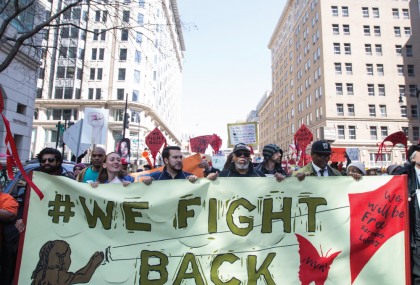
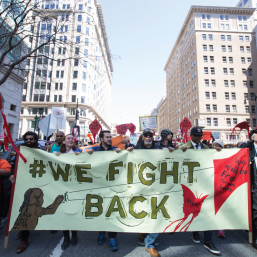
Trump’s budget is the best indication we have of his priorities as president. And it should come as no surprise that he wants to bolster his deportation forces and spend billions on a racist, needless wall and even more on crony defense contractors, while cutting the programs and investments that people in this country need to live healthy and stable lives.
The Center for Popular Democracy believes that we can --and must-- invest in policy priorities that are premised on respect and commitment to community dignity. We believe that when we invest in the resources that we all need to thrive -- like health care, housing, and education -- we build safe and viable neighborhoods. These are the priorities of the people in this country and should be reflected in the budget.
We’ve contrasted Trump’s vision with ours. It’s possible to build a federal budget to provide for all people in this country, whether white, Black or Brown. We need a budget that invests in the resources that help our communities thrive, instead of Trump’s budget cuts and wasteful spending on a xenophobic and racist agenda.
Criminal Justice and Immigrant DetentionTrump's budget allocates additional billions of dollars towards immigration detention and deportation, and pass-through grants to local and state police departments which fuel mass criminalization and mass incarceration.
The budget increases funding by almost 20 percent for the deportation forces of ICE and Border Patrol. It represents a continued commitment to over-policing, mass criminalization and mass incarceration.
Our federal dollars should be used to advance public safety through an investment in the health and well-being of communities, including in substance abuse, mental health, youth services, housing, education and neighborhood infrastructure.
Public HealthTrump wants to worsen our public health crises by cutting Medicare spending by $845 billion over the next 10 years, cutting SNAP by $17.2 billion just this year, and slashing federal health spending.
Trump went against his commitment to ending the HIV/AIDS epidemic and curtailing the opioid epidemic with these budgetary proposals. Instead of putting the resources into a single-payer health system that would cover all people in this country, he has chosen to leave our sick to flounder.
If we are going to take on public health crises like the opioid epidemic and decrease the rate of uninsured in this country, we need new funding sources. The CARE Act and Medicare for All help to make our country healthy. Cuts to medical and nutritional services do anything but.
HousingThe budget would cut the Department of Housing and Urban Development’s budget by 14 percent, or $6.8 billion dollars.
Because of the cuts, the poorest tenants in publicly-subsidized rental housing would face soaring rents. The federal government would walk back on its commitment to construct and maintain housing in both rural and urban communities. People across the country face an affordable housing crisis that this budget would worsen.
We need deep investments in public and affordable housing and programs that support struggling families, increased and expanded tenant protections, including rent control, just cause evictions and right to counsel, and the regulation of predatory corporate landlords.
Census and DemocracyTrump’s budget jeopardizes a fair U.S. Census count, requesting $7.2 billion for the entire Census when stakeholders estimate that it would cost at least $8 billion to carry out 2020 Census activities in FY 2020 alone.
Trump's budget drastically underfunded the Census and signals the lack of administration support for a fair and accurate count — one that counts all communities equally well.
When everyone is counted in the Census, our government and civil society can make sure that we all have the protections and resources that we need to thrive. We need accurate demographic counts of all our communities, regardless of how we look, where we live, or what our immigration status.
Labor and Workforce ProtectionsTrump’s budget cuts the Department of Labor by nearly 10 percent, which cuts into lifelines like unemployment insurance.
While the federal government has not increased the minimum wage in 10 yrs, this projected debt load will lead to slower income growth and less opportunities for workers. This sham proposal comes in the context of a draconian budget that calls for deep cuts to programs that millions of families rely on.
Instead, Trump could fully fund a paid family leave policy that ensures coverage for all workers instead of excluding 75% of those who take time to care for family members with their own serious injuries or health. The only remedy is real, comprehensive paid family medical leave policy - one that is sustainably funded (not at the expense of already depleted UI) and reflects the true needs of American workers.
EducationTrump proposed a $7.1 billion cut to the education budget, though it asks for a $60 million increase in funding for charter schools. It also increases funding for “school safety measures” that increase militarization and hardening of schools.
In response, Education Secretary Betsy DeVos said that the budget is fundamentally about “education freedom.” This statement demonstrates the administration’s adherence to an education privatization agenda. To talk about the education budget as being fundamentally about "education freedom" circumvents the fact that education should be about equity and high quality. It also ignores the growing movement by teachers and parents calling to an end to charter expansion and renewed investment in teachers and public schools.
We envision a flourishing system of public education where all students can learn and grow. Fully-funded public schools give all students the opportunity to thrive. Instead of school surveillance technology that make students of color feel less safe in the classroom, we need investment in guidance counselors, restorative justice practices, and mental and emotional health services.
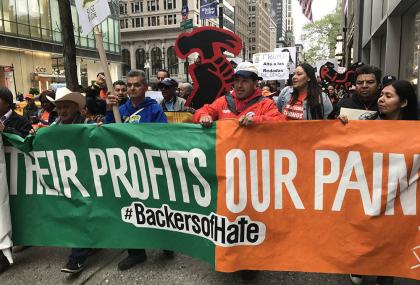
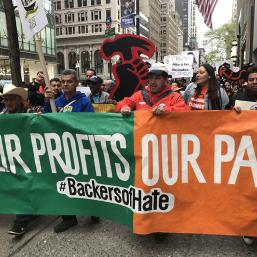
On March 12, Wells Fargo’s CEO told Congress that the bank is exiting the private prison industry! Over the past two years, immigrant organizations and allies participating in the Corporate Backers of Hate campaign have been working to expose the Wall Street companies that enable Trump’s aggressive anti-immigrant agenda, and pressuring these banks to stop financing private prison and deportation companies.
This victory is the result of two years of sustained organizing led by immigrant families, and comes days after JPMorgan Chase announced its decision to stop funding private prisons and immigrant detention companies. This was the first major bank to make such an announcement, marking a potential turning point in the fight against the industry that cages humans for profit.
When JPMorgan made its announcement, we celebrated, and then we got back to work ramping up the pressure on Wells Fargo and other banks to do the same. And it worked!
In a Congressional hearing earlier this week, Wells Fargo CEO Timothy Sloan told House Financial Services Committee member Rep. Alexandria Ocasio-Cortez that it is ending its relationship with both GEO Group and Core Civic, the largest private prison corporations in the country. Private prison companies have relied on debt financing from Wall Street to sustain their day-to-day operations and facilitate their rapid expansion under Trump.
Following this important victory, we will continue to hold JPMorgan Chase and Wells Fargo accountable and work to ensure that all banks cut ties from this morally bankrupt industry.
These victories are only possible because people across the country showed up for each other, organized together, and forced these major Wall Street firms to reckon with the human impact of their financing practices.
We are so proud to stand shoulder to shoulder with the CPD affiliates whose members have led this fight with courage and determination, including Make the Road NY-NJ-PA-CT-NV, New York Communities for Change, CUFFH and Action NC. We are immensely grateful for the leadership of allied organizations that threw down to make these victories possible, including MomsRising, Freedom To Thrive (Enlace), Hand in Hand, JFREJ, CREDO, National Domestic Workers Alliance, LittleSis, In the Public Interest, Presente.org, Rainforest Action Network, Workmen’s Circle, the Candide Group and the entire #FamiliesBelongTogether coalition. We also deeply appreciate and recognize the Forego Wells Coalition (including ACRE, the Committee for Better Banks, and ACCE), who has been working to hold Wells Fargo to a higher standard of responsibility to workers and communities for years.
CPD Executive Director, Ana María Archila, and Make the Road New York Executive Director, Javier H. Valdés said it perfectly in The Nation last week: “By continuing to take on both the public and private sources of funding, we can put this morally bankrupt industry out of business once and for all.” Together, we have made clear that private prisons and their financial backers positioned themselves to gain from Trump’s immigration crackdown.
And together, we will continue to fight to hold Wall Street accountable, keep our families together, and ensure we all have the freedom to thrive. Can we count on you to join us? Make a donation today to support this vital work.
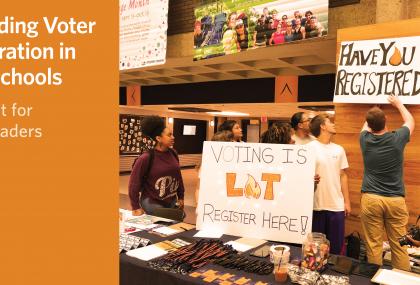
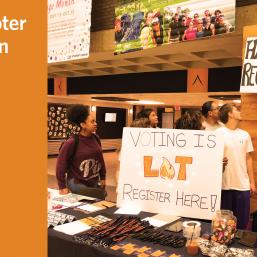
In February, CPD released a new toolkit titled, “Expanding High School Registration: A Toolkit for Local Leaders.” After more than a decade of attacks on voting rights–including efforts to blunt the power of young people and communities of color–democracy is at a crossroads. This toolkit offers resources for local leaders to proactively expand access to the ballot in order to increase the representation and build the long-term power of young people. Specifically, the toolkit includes resources to help local leaders pass high school registration policies, which require that schools provide dedicated voter registration opportunities, at least two times per year, to every student who is eligible.
The toolkit also offers guidance on how to ensure that high school registration policies are meaningful in practice: schools must partner with young people and community-based organizations to design curricula, engage students in every phase of program design, and ensure that programs are inclusive of all students, regardless of their eligibility to vote. The toolkit contains a model high school voter registration policy and model regulations; best practices for building comprehensive high school voter registration programs, which includes considerations for how to effectively engage community groups and students in the design of a successful voter registration program; and communications materials, which help local elected officials and advocates communicate effectively about the importance of student voter registration and the effectiveness of high school-based voter registration.
By passing high school registration policies, school districts can lead the way in helping to reduce generational disparities in registration and voting, and in cultivating a lifetime of civic engagement among young people. Read the full toolkit on our website.
On February 19, CPD's Voting Rights & Democracy team held a webinar to dive deep into how we expand youth voter registration. Check it out below!
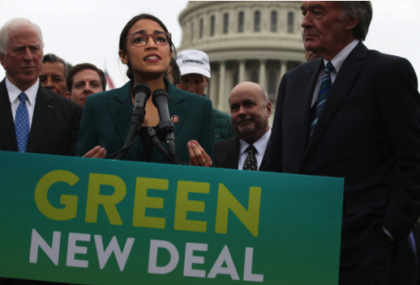
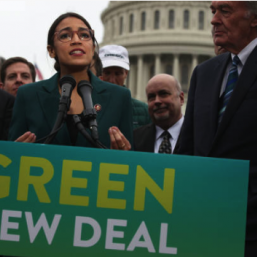
On February 7, Senator Ed Markey of Massachusetts and Representative Alexandria Ocasio-Cortez of New York introduced resolutions in their respective chambers to build momentum for a Green New Deal. The CPD Network was an early and proud endorser of the plan and we are introducing a series of environmental justice measures across the country that will impact the lives of millions and help repair our planet for all. We know that now is the time to be bold and unapologetic in demanding solutions to our climate crisis writ large and in our communities.
From fighting the poisoning of water in Flint and Milwaukee, to healing our coastal communities impacted by ever worsening climate disasters, to organizing against mining companies that bring cancer and early death to their workers in Appalachia, CPD Affiliates are on the frontlines, working to transform our economy into one that supports families and protects our planet so that all of our communities – and our planet – can thrive.
The Green New Deal helps build climate resilience locally, in communities of color who have been most impacted by climate change, and ensure that Black and Latinx people will have direct access to good family-supporting jobs in the new green economy. The Green New Deal resolution is a landmark solution to climate change.
"In our current climate crisis, now is the time to be bold in our vision of the future,” said Veronica Coptis, Executive Director of the CPD affiliate the Center for Coalfield Justice. “As we turn these visions into actions, we must ensure that frontline communities - those who live with the unjust effects of climate change, pollution, and extraction - are leading the way."
“A fair and just future will be won not in the halls of Congress, but in places like Detroit and Flint, where residents have largely been left out of the national economy and will be most impacted by the damaging effects of climate change,” said Branden Snyder, Executive Director of CPD affiliate Good Jobs Now. “Good Jobs Now believes that in order to fight this existential threat of climate change we must pass a Green New Deal.”
Inequality and climate change are the moral and existential crises of our time. The Green New Deal is a 10-year plan to mobilize every aspect of American society to achieve net-zero greenhouse gas emissions and create economic prosperity for all. The CPD Network will be playing a key role in federal advocacy while also working hard to make change in cities and states. Please support the CPD Network today in making this vision a reality by donating today.
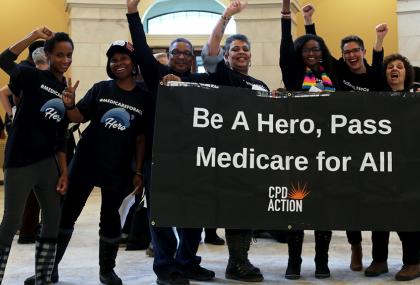
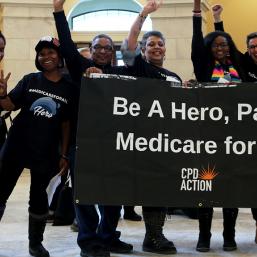
On February 27, over 100 people joined Representative Pramila Jayapal in Washington, DC, to launch the Medicare For All Act, laying out a historic health agenda for the United States. The Center for Popular Democracy, National Nurses United, Our Revolution, and Social Security Works are among the groups backing the new bill as the best path forward on healthcare. The Medicare For All Act is a landmark comprehensive bill that would ensure all Americans would be covered and would eliminate copays, deductibles, and out of pocket expenses. The announcement made headlines in major outlets like ThinkProgress, Huffington Post, Common Dreams, The Intercept and Bloomberg.
Network President and CPD Co-Executive Director, Jennifer Epps-Addison, spoke at the press conference to announce this measure. Epps-Addison explained that, “The Medicare For All Act is the only viable fix to a healthcare system that leaves far too many people in this country behind. I have the privilege of good employer-based insurance, but even that wasn’t enough when my husband was diagnosed with Multiple Sclerosis. I pay $830 a month just in premiums, just to struggle to afford copays and prescription costs, and still any job change or financial emergency could threaten my husband’s life. A system that profits off our pain and misfortune will never deliver the healthcare our families deserve–and that’s why we’re rallying behind this groundbreaking legislation.”
In the United States today, 30 million people are uninsured while another 40 million are underinsured. “We have the most expensive healthcare system in the world and yet our outcomes are the worst of all industrialized countries,” said Representative Pramila Jayapal. “I and the more than 100 co-sponsors of this bill refuse to allow this to continue. It’s time to put people’s health over profit. It’s time to ensure that healthcare is a right and not a privilege, guaranteed to every single person in our country. It is time for Medicare for All.”
This is a problem felt nationwide–in black and white neighborhoods, rich and poor households, rural, suburban and urban environments. A problem that affects us all, demands a solution that includes us all. The CPD Network is proud to advocate for this bold solution to the healthcare crisis that ensures that all people in this country have access to care. We need change and we need it now.


On February 12, CPD released a report with the National Employment Law Project (NELP), Fast Food Justice, and 32BJ SEIU: “Fired on a Whim: The Precarious Existence of NYC Fast-food Workers.” The report reveals that the lives of New York City’s 67,000 fast-food workers are frequently upended by arbitrary firings and dramatic cuts in hours that lead to housing instability, food insecurity, and family stress. The solution? Requiring fast food employers to demonstrate “just cause”–a substantial and verifiable reason–for terminations and significant reductions in hours. The release made headlines in The New York Times, The Guardian, New York Magazine, New York Daily News, Telemundo, and Politico among other smaller outlets.
Many people are surprised to learn that their employer can terminate them whenever they choose, for almost any reason. Today employees have no right to receive a warning before being fired, or even learn the reason they’ve been terminated. Employers can also dramatically reduce work hours, leaving workers earning so little that they are forced to quit. Workers can be fired for reasons as arbitrary as having nails that are “too long” or for “not smiling enough.” This model, called “at-will” employment, sows chaos throughout the fast-food industry, causing stress and financial instability for thousands of New York City families. Arbitrary and often biased managers wield enormous power over workers who are struggling to pay their bills, discouraging workers from speaking up about unsafe and unfair working conditions like sexual harassment and wage theft.
The report reveals findings from an original survey of 539 New York City fast-food workers, which shows that fast-food employers terminate workers with alarming frequency, that drastic cuts in hours are common, and that many workers are denied even a basic explanation when terminated. On February 13, CPD’s Chief of staff Amy Carroll joined fast-food workers and NYC Councilmember (and Local Progress co-chair) Brad Lander on the steps of City Hall to discuss the report and support the introduction of CM Lander’s and CM Adrienne Adams’ “Just Case” bill. This legislation would hold fast-food giants accountable by requiring employers to demonstrate a legitimate reason for terminating workers or reducing their hours. CPD is proud to be advancing a policy that would bring stability and security to thousands of fast-food workers, and to the families and communities in which they play an integral role. Read the full report on our website.
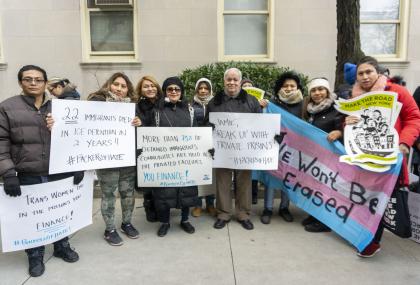
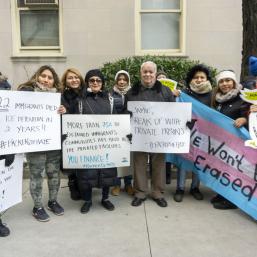
On Valentine’s Day, February 14, CPD joined Make the Road New York (MRNY) and allies in New York City to pay an early morning visit to the home of Jamie Dimon, the CEO of JPMorgan Chase, to call on the bank to stop financing private prison and immigrant detention companies. The groups were joined by a mariachi serenade featuring break-up songs as immigrants, TGNCIQ+ (transgender, gender non-conforming, intersex, and queer) New Yorkers, and allies demanded the bank stop bankrolling the suffering of their communities.
The event was organized by the Corporate Backers of Hate campaign, which, for the past two years, has taken direct actions against powerful corporations like JPMorgan Chase and Wells Fargo for financing companies like Geo Group and CoreCivic–private prison companies responsible for terrorizing people of color and immigrant communities in pursuit of profit. This rally was part of a nationwide day of protest led by the #FamiliesBelongTogether Accountability Committee who worked with community organizations across the nation to deliver petitions to JP Morgan and Chase Banks and whose efforts forced Wells Fargo to limit their investments in private detention centers over the course of the year.
On Tuesday, March 5, JPMorgan Chase announced that they will end their practice of financially backing private prison and immigrant detention companies. This victory is the result of significant pressure from immigrants and their families participating in the Corporate Backers of Hate campaign to urge financial institutions to cut their financial ties with Geo Group and CoreCivic, the private prison companies responsible for terrorizing people of color and immigrant communities in pursuit of profit. Please join us in congratulating all the affiliates, organizations, allies, and immigrant families that were central in this fight for our communities!
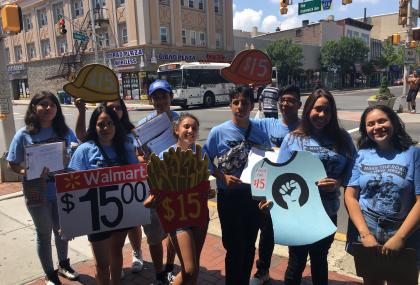
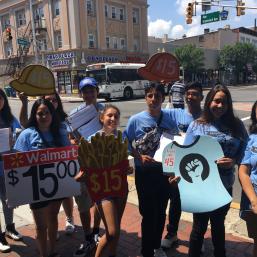
In January, New Jersey won $15 by 2024 impacting 1 million workers. Make the Road New Jersey (MRNJ) and allies organized to secure this victory for workers. When it appeared that youth would be excluded, they mobilized more than 150 young people over 10 weeks this summer to get 6,000 petition signatures for a clean minimum wage bill. They built organizing committees of low wage adult and teen workers and fostered truly intersectional alliances among youth across gun control, immigration, and worker rights, as well as combined direct action and a strong social media game with traditional canvassing.
True momentum led to MRNJ leader, Giovana Castaneda, introducing Governor Murphy for the bill signing. The leading headline from this fight is the power of youth organizing and ability to set a bold economic justice agenda. Congratulations to MRNJ for this monumental win for our communities!
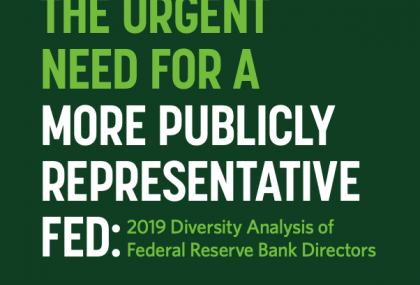
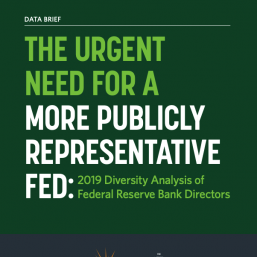
In February, the Fed Up Campaign released “The Urgent Need for a More Publicly Representative Fed: 2019 Diversity Analysis of Federal Reserve Bank Directors” which reveals a shocking lack of progress in diversity among the nation’s most powerful monetary policymakers. Every year the Fed Up Campaign conducts an analysis of the gender, racial, and occupational diversity of the Federal Reserve system’s leadership. This is designed to gauge progress on the Federal Reserve’s public commitments to diversity and highlight areas for continued growth in the coming year.
This year’s report was released in an exclusive with Forbes which pointed out that, “The relative absence of women and racial minorities [in the Fed] is problematic... Within the Federal Reserve, this lack of diversity can create blind spots on critical issues that impact historically underrepresented groups.” This original analysis is the only of its kind and often garners wide coverage in the media, which adds important public pressure to the Fed.
The data shows the Federal Reserve is backsliding on the incremental progress it made on diversity in 2018. In 2019, among the 108 current Fed Board Directors: 76% come from the banking or business sectors, 74% are white, and 62% are male. Unfortunately, these diversity issues also extend to Federal Reserve Bank Presidents who are overwhelmingly (83%) white and are most commonly recruited from with the Federal Reserve’s existing leadership or the finance sector. In fact, 3 of the 12 current Fed Presidents have strong ties to Goldman Sachs--an institution the Fed is tasked with regulating. Without diverse perspectives, the Federal Reserve’s failure to represent the interests of the American people will persist. In 2019, policymakers and advocates continue to call on the Federal Reserve to actively pursue greater diversity at all levels of its leadership. Read the report in full on our website.



